
Satsuma Province was an old province of Japan that is now the western half of Kagoshima Prefecture on the island of Kyūshū. Its abbreviation was Sasshū (薩州).

The mandarin orange, also known as mandarin or mandarine, is a small, rounded citrus tree fruit. Treated as a distinct species of orange, it is usually eaten plain or in fruit salads. Tangerines are a group of orange-coloured citrus fruit consisting of hybrids of mandarin orange with some pomelo contribution.
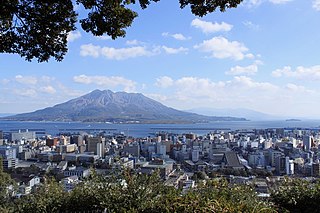
Kagoshima Prefecture is a prefecture of Japan located on the island of Kyushu and the Ryukyu Islands. Kagoshima Prefecture has a population of 1,564,175 and has a geographic area of 9,187 km2. Kagoshima Prefecture borders Kumamoto Prefecture to the north and Miyazaki Prefecture to the northeast.

The Satsuma Rebellion, also known as the Seinan War, was a revolt of disaffected samurai against the new imperial government of Japan, nine years into the Meiji era. Its name comes from the Satsuma Domain, which had been influential in the Restoration and became home to unemployed samurai after military reforms rendered their status obsolete. The rebellion lasted from 29 January until 24 September of 1877, when it was decisively crushed, and its leader, Saigō Takamori, was shot and mortally wounded.

Citrus unshiu is a semi-seedless and easy-peeling citrus species, also known as the satsuma mandarin or Japanese mandarin. During the Edo period of Japan, kishu mikans were more popular because there was a popular superstition that eating Citrus unshiu without seeds made people prone to infertility. Citrus unshiu became popular in Japan after modernization started in the Meiji period. It was introduced to the West from the Satsuma region of Japan in 1878.

Character displacement is the phenomenon where differences among similar species whose distributions overlap geographically are accentuated in regions where the species co-occur, but are minimized or lost where the species' distributions do not overlap. This pattern results from evolutionary change driven by biological competition among species for a limited resource. The rationale for character displacement stems from the competitive exclusion principle, also called Gause's Law, which contends that to coexist in a stable environment two competing species must differ in their respective ecological niche; without differentiation, one species will eliminate or exclude the other through competition.

The Satsuma Domain, briefly known as the Kagoshima Domain, was a domain (han) of the Tokugawa shogunate of Japan during the Edo period from 1602 to 1871.
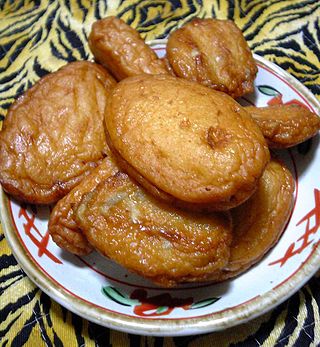
Satsuma-age (薩摩揚げ) is a fried fishcake originating from Kagoshima, Japan. Surimi and flour is mixed to make a compact paste that is solidified through frying. It is a specialty of the Satsuma region. It is known by a variety of regional names throughout Japan.

Cold-hardy citrus is citrus with increased frost tolerance and which may be cultivated far beyond traditional citrus growing regions. Citrus species and citrus hybrids typically described as cold-hardy generally display an ability to withstand wintertime temperatures below −5 to −10 °C. Cold-hardy citrus may be generally accepted 'true' species or hybrids involving various other citrus species. All citrus fruits are technically edible, though some have bitter flavors often regarded as unpleasant, and this variability is also seen in cold-hardy citrus fruits. Those listed as "inedible fresh" or "semi-edible" can be cooked to make marmalade.
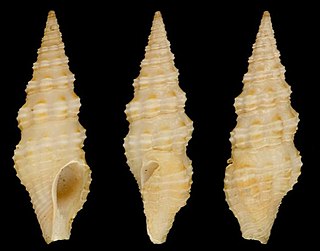
Compsodrillia eucosmia is a species of sea snail, a marine gastropod mollusc in the family Pseudomelatomidae, the turrids and allies.
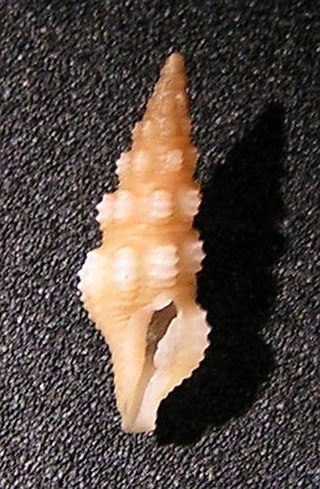
Compsodrillia haliostrephis, common name the spindle drillia, is a species of sea snail, a marine gastropod mollusc in the family Pseudomelatomidae, the turrids and allies.

Eulithidium is a genus of small colorful sea snails, marine gastropod mollusks in the family Phasianellidae, the pheasant shells.

Thysanodonta is a genus of sea snails, marine gastropod mollusks in the family Calliostomatidae.

Thysanodonta eucosmia is a species of sea snail, a marine gastropod mollusk in the family Calliostomatidae.

Marginella eucosmia is a species of sea snail, a marine gastropod mollusk in the family Marginellidae, the margin snails.

Cellana eucosmia is a species of limpet, a marine gastropod mollusc in the family Nacellidae.
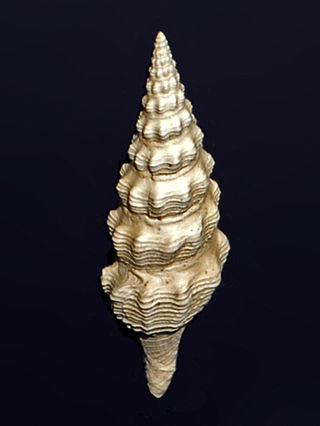
Stenodrillia is a genus of sea snails, marine gastropod mollusks in the family Drilliidae.
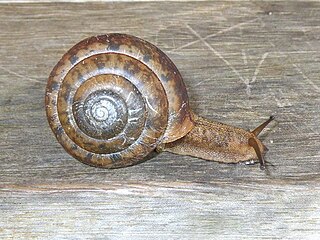
Satsuma is a genus of air-breathing land snails, terrestrial pulmonate gastropod mollusks in the tribe Aegistini of the subfamily Bradybaeninae in the family Camaenidae.

Iolaea eucosmia is a species of sea snail, a marine gastropod mollusk in the family Pyramidellidae, the pyrams and their allies.

Ganesella is a genus of air-breathing land snails, terrestrial pulmonate gastropod mollusks in the subfamily Camaeninae of the family Camaenidae.



















